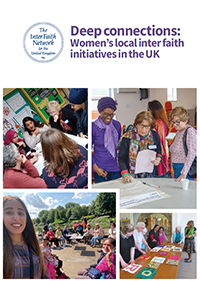Women and inter faith engagement
Women are increasingly involved in inter faith activity through mixed gender national, regional and local organisations, activity and engagement and also through a number of women’s inter faith initiatives developed by and for women.
In 2023, IFN published Deep Connections: Women’s local inter faith initiatives in the UK. The report is the fruit of a project which looked at a wide range of women’s inter faith initiatives at local level across the UK. Drawing on information supplied by these groups and from other sources, it highlights examples of their activity and explores benefits and challenges and demonstrates their considerable significance. It also includes a compendium of summary information about each group that was surveyed.
The report notes 50 such groups in the UK. Some operate in very diverse areas such as the groups in Glasgow, Leeds, Manchester and Wolverhampton; others in areas with more scattered areas of diversity such as Gloucestershire. Some are linked to offshoots of mixed gender local inter faith organisations such as Calderdale Interfaith, Redbridge Faith Forum in London and Woking People of Faith. A few are connected to a particular faith base, such as ones linked to the Catholic Diocese of Hexham and Newcastle; Community House in Newport; and Christians Aware’s Faith Awareness Programme, based in Leicester. 19 of the groups noted are branches of Nisa-Nashim or groups of the Women’s Interfaith Network.
Among the reasons groups say they have been established are:
- making friends with women of different backgrounds;
- seeking understanding of other faiths and to raise awareness of their own;
- developing skills and confidence in areas such as public speaking and community leadership;
- helping develop and deepen bonds between local communities;
- artistic expression; and
- joint social action on issues from climate change to mental health and violence against women and girls.
The activities of the women’s groups are wide-ranging: dialogue; education; arts and crafts; activism; and celebrating or marking special times such as International Women’s Day; health and sports activities; and more
The report includes a ‘top tips’ section to help readers who would like to start a similar group or develop an existing one. They are equally applicable, in many cases, to local inter faith activity more generally.
Women’s inter faith dialogue groups began to emerge in the 1990s for a number of reasons. Dr Fatheena Mubarak Iqbal explored these in a report specially commissioned by IFN in 2006 (the full report is available here). Dr Iqbal found a number of reasons for women’s inter faith engagement, including:
- A conviction that women possess particular qualities that encourage inter faith work, such as a non-adversarial/non-confrontational approach to solution finding or good listening skills;
- A dislike on the part of some for formal structure of the kind that mixed gender inter faith groups may have;
- Wanting safe, comfortable or more relaxed spaces for encounter;
- Cultural and religious beliefs limiting participation of women in inter faith activity when such activity is open to both men and women;
- A sense of common experience, for example as mothers;
- Difficulty having their voices heard in mixed groups such as those which were mainly led by male religious leaders.
Further Resources
If you are interested in finding out about joining or setting up a women’s inter faith group, you may like to contact:
The Women’s Interfaith Network https://www.wominet.org.uk/
Religions for Peace UK Women of Faith Network https://www.rfpuk.org/ukwfn
Nisa-Nashim (Jewish-Muslim) https://www.nisanashim.com/
If you are in Scotland, contact Interfaith Scotland, which runs a number of local dialogue events for women, and also links a number of local women’s inter faith groups. More information can be found here.
For opportunities in Northern Ireland and Wales, contact ni.interfaith@gmail.com and chair.icw@gmail.com, respectively.



